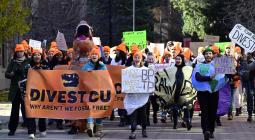Cows help farms capture more carbon in soil, study shows
Research also reveals that a mixture of arable crops and cattle helps improve the biodiversity of the land
Cows may belch methane into the atmosphere at alarming rates, but new data shows they may play an important role in renewing farm soil.
Research by the Soil Association Exchange shows that farms with a mixture of arable crops and livestock have about a third more carbon stored within their soil than those with only arable crops, thanks to the animals’ manure.
This also has an effect on biodiversity: mixed arable and livestock farms support about 28 grassland plant species in every field, compared with 25 for arable-only and 22 for dairy-only.
Joseph Gridley, chief executive of SAE, which was set up by the Soil Association in 2021 to support and measure sustainable farming, said it was unlikely that carbon captured in soil would balance out the enormous amounts of methane created by cattle. Farm livestock around the world creates about 14% of human-induced climate emissions.
“It’s pretty unequivocal in the data that having livestock on your farm does mean you have more emissions – five or six times more emissions,” he said. “But if you integrate livestock into the system, on every metric on soil health, there’s an improvement, and on a lot of the biodiversity measures as well.”
Soils are degrading, but by how much exactly is unclear. In 2015, the UN Food and Agriculture Organisation claimed that the world had only 60 harvests left, but researchers at Oxford University and Our World In Data said in 2021 that there was a complex picture, and that while there were 16% of soils with an expected lifespan of fewer than 100 years, a third were expected to last at least 5,000.
The Department for the Environment, Food and Rural Affairs has been investigating so-called methane blockers as a way to reduce emissions. Adding substances such as essential oils, probiotics and even seaweed to cattle feed can reduce the amount of burps and wind they generate.
Last month the Green Alliance charity said that feeding Bovaer, a methane blocker, to a third of the UK’s dairy cows would cut the country’s emissions by about 1%. Yet this is not happening, the campaign group warned, because farmers were unwilling to pay extra for something they did not benefit from. It said methane blockers should be subsidised, as other green farming schemes were.
Cover photo: Livestock produces a lot of methane, which is unlikely ever to be balanced out by carbon captured in the soil, but it does have some positive effects, according to the Soil Association Exchange. Photograph: Getty Images




